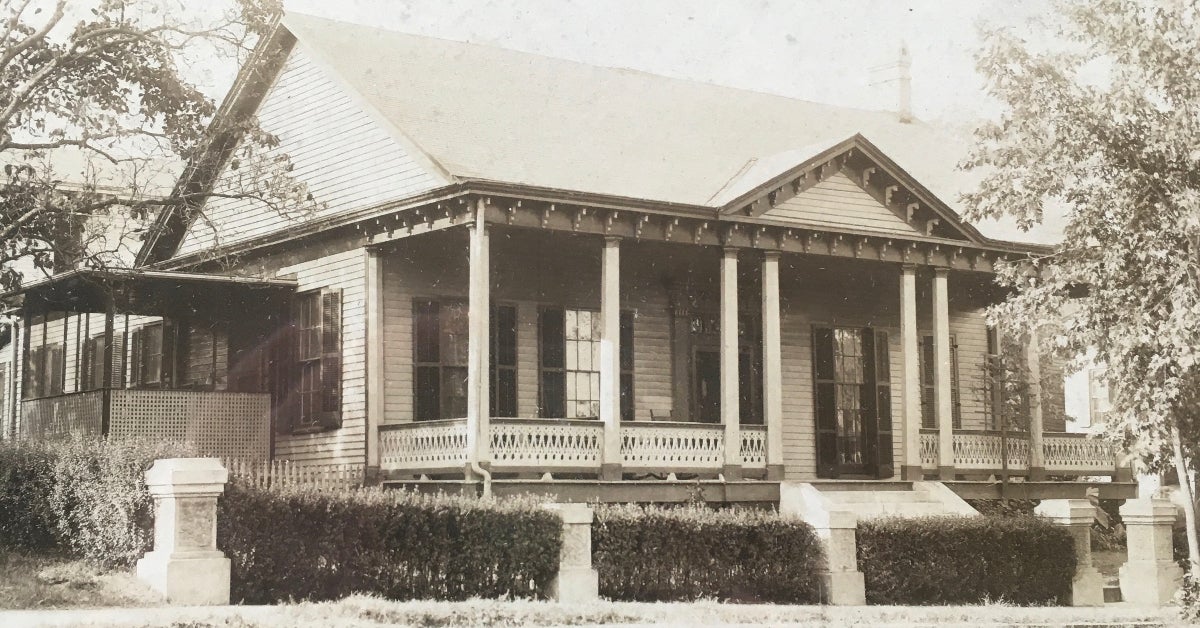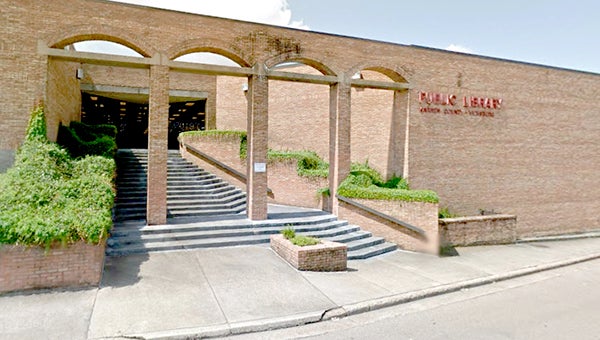LOOKING BACK: More 1000 Main St. Memories
Published 8:00 am Friday, February 17, 2023

- The home at 1000 Main St. as pictured in the early 1900s. (Photo Courtesy of Mary Martha Hilbun)
By Nancy Bell | Vicksburg Foundation for Historic Preservation
One of the most fun things about writing these articles is that I get to hear from people who have connections to buildings that I write about.
After the first story giving the history of 1000 Main Street appeared in the paper, I received a delightful call from Mary Martha Hilbun, whose grandparents bought the house in April 1919. She also shared the two historic photographs with me which show the original detailing of the porch, a wonderful find. Mary Martha’s grandparents were Minnie and Prospero Gargaro. Prospero was a grocer and president of the Vicksburg Bottling Company in 1921 and later. Mary Martha said that the young ladies sitting on the porch in the photo are her mother, Pauline, and sister, Adeline. She said that she and her family also lived in the house after her father died. The Gargaro-Hilbun family owned the house for nearly 80 years, selling it in 1998 to Jo and Kim Wilson and then it was bought by Cindy and Charles Calais and has been lovingly maintained by them. Mary Martha also told me that this house withstood the 1953 tornado, losing windows and part of the roof.
In order to finish the story of the occupants of this house, we have to go back to the years after Rabbi Bien died and before the Gargaros bought it. In 1906, Charles and Beulah Bloch owned the house. Bloch was a bookkeeper for D.J. Shlenker and Company. A report in the Vicksburg Post while the Blochs lived there stated that sparks from the chimney burned a hole in the roof and that it was quickly extinguished. In 1910, Dr. Wesley and Ruth Howard bought the house from the Blochs for $5,000. Howard was a black pharmacist who owned Howard’s Drug Store. In 1911, the Howards had sold the house to Dr. J.A. Miller, a Black physician. In July 1918, toward the end of World War I, Dr. Miller and Dave Cook, a white man, were accused of being disloyal to the United States Government. Cook was heard to say, according to an article in the Vicksburg Herald, “He would see the U. S. Government in hell before he would give it one of his boys.”
It was also stated that for some time he had freely expressed on numerous occasions sentiments which led to the belief that he was pro-German. Cook denied the claims saying that “I will take an oath that I have never said anything in my life that might be considered disloyal.”
A group of men kidnapped Cook, tarred and feathered him, and placed him in front of city hall in front of a large crowd of onlookers. Dr. Miller was then brought to city hall, having also been kidnapped and tarred and feathered.
The Vicksburg Herald reported that he was “frightened speechless, after one or two attempts to talk, he made no further effort and neither affirmed nor denied the disloyalty charge.” He was accused of spreading propaganda that was negative about the U.S. government. Before the crowd resorted to violence, Mayor J.J. Hayes appealed to the crowd that law and order be immediately restored. The crowd was ordered to disperse and he declared the “he did not want any more of it.”
The mayor was later commended for his success in dispersing the crowd.
The mayor and police were able to get both men into cars and took them to the jail where they helped them remove the tar and feathers. Cook was then given a train ticket for Memphis after he assured officials that he would never return to Vicksburg. Dr. Miller was not told to leave the city as he had not said that he was disloyal. He did however say that he intended to get his affairs in order and move to Detroit. However, the mayor and police collected evidence that supported the claims of being disloyal and he then admitted to making disloyal remarks and he was told to leave.
Two other black men, attorney T.G. Ewing, Jr. and druggist William P. Harrison, were also sought by the mob who accused Cook and Miller, but they couldn’t find Ewing, and Harrison was in New Orleans on that night. The following day, John Brunini, chairman of the Warren County Liberty Loan Committee, provided a letter to the Vicksburg Evening Post stating that Ewing had personally donated to the fund and had helped with drives to collect donations within the black community to support the war effort. The letter was signed by seventeen leading white Vicksburgers. Harrison swore that he had never been disloyal. This apparently appeased those who had accused Ewing and Harrison.
Following the incident, Mayor Hayes addressed a large gathering of African Americans at King Solomon Church. The Vicksburg Herald reported that the Mayor stated that “he regretted the incident very much, and explaining in a forceful and impressive manner, made plain the fact that such is likely to occur not only in this city but in any other community when belief in general regarding any acts or utterances of disloyalty.”
He “highly commended the patriotism of the colored people as shown in the past, which he said speaks well for any community.”
An article in the Vicksburg Evening Post of April 26, 1919, reported that “A property transfer of considerable interest took place during the past week, when the residence of Dr. J.A. Miller, former colored physician here, was sold to Prospero Gargaro. The property which is located at the corner of Cherry and Main streets, was sold for $3,700, which is considered very cheap. The transfer was made in the name of Miller’s wife. He (Miller) bought the property from Mrs. Charles Bloch in December 1911, paying $3,200 for it; $1,200 in cash and the balance paid in two promissory notes of $1,500 each. After the purchase, Miller put many improvements on the place, erected a garage in the rear and also paid for the Cherry Street paving along the west side. He was trying to get $5,500 for the property when advised to leave Vicksburg for his health.”
It is sad to say that Dr. Miller committed suicide in Detroit on Oct. 17, 1931.
Thank you again to Mary Martha Hilbun for the use of the photographs and for the wonderful conversation about this house and about her family.





